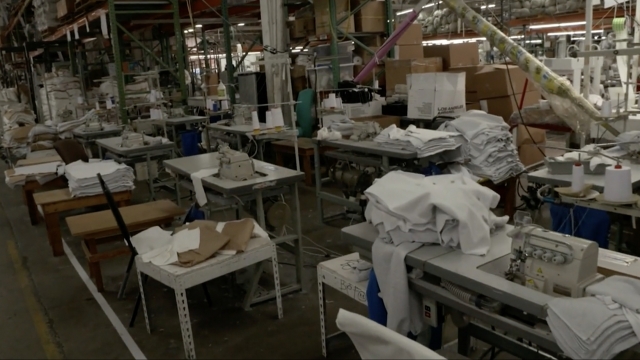It's not exactly a secret the fashion industry as a whole has a long history of labor abuses and poor working conditions when it comes to garment workers.
Though many may think the industry has generally put its sweatshop past behind it or that it's only still happening in distant parts of the world, it hits closer to home than one would think.
In late 2019, the U.S. Labor Department investigated factories making clothes for popular brands like Fashion Nova. It found the factories owed millions in back wages and alleged some were paying sewers as little as $2.77 an hour. The factories were all based in Los Angeles.
In the five years since, a major transformation has been happening, and a groundbreaking new law in California might be the major step needed to change the U.S. fashion industry for good.
To understand the major shift, it comes back to how the supply chain for fashion works in the first place.
At a very basic level, fashion brands work with the companies that design the clothes. Those ship fabric to contracted sewing companies, which is where workers put the garments together. It's at this stage that garment workers can face a number of common problems known in the industry:
For starters: payment. Garment workers don't always get hourly rates. Sometimes they're paid in "piece rates," meaning workers are often paid for each piece of the garment they sew instead of hourly rates. According to advocates for garment workers' rights, to make the minimum wage in LA, a worker paid 5 cents apiece has to sew 325 pieces an hour.
Unpaid wages are a rampant problem too, especially in the two biggest epicenters for garment workers in the U.S: Los Angeles and New York. One advocacy group estimated businesses in New York aren't paying about $1 billion a year to garment workers across the state. Many workers still don't see the full wages they're owed, even if they are successful in court.
A big reason for that is that the garment industry has one of the highest percentages of immigrant workers in the U.S. An analysis from the Center for Public Integrity found industries with more foreign-born workers had higher rates of wage theft. Many workers don't feel able to bring up complaints because they're worried about threats and their own immigration status.
The big question is: Who is held accountable for what goes on at the problematic contractors?
Under federal law, the brands can't be penalized for wage theft in any factories if they can credibly claim they didn't know the workers were paid illegally low wages.
The way things are currently set up, it's pretty easy for brands to make that case. For instance, the Labor Department has collected millions in back wages and penalties from the garment industry in LA alone, but according to the New York Times, the Labor Department has yet to fine an actual retailer. This lack of accountability can make some of these scandals start to feel repetitive.
But in recent years, a global movement began to gain momentum to protect garment workers' rights. In 2019, massive protests in Bangladesh bubbled up, and in 2022, three major lawsuits for back pay or labor violations were eventually won by garment workers in Haiti and Thailand . That global momentum found its way to the U.S., too.
"Fashion brands have created poverty wages through the unrealistic pricing of garments yet have no legal liability for the exploitation which occurs," said former Democratic California Rep. Lorena Gonzalez. "A report by the UCLA Labor Center documented the garment industry as having the highest level of wage theft violation by industry and second highest by occupation."
Just over one year ago, SB 62, also known as the Garment Worker Protection Act, went into effect in California. It makes California the first state to require hourly wages instead of piece rates and introduces new accountability measures. Now, the brands and manufacturers can also get penalized for wage theft and other violations. The bill was even backed by over 150 retailers and designers — including some bigger names like Eileen Fisher, Reformation, and more.
And the first federal bill to protect garment workers was also introduced last year.
"Today I'm here to announce new legislation called the FABRIC act… it stands for fashion accountability and building real institutional change," said Sen. Kristen Gillibrand, (D) New York.
So after years of criminally low pay, intimidation, stolen wages, and after a global organizational effort from workers, the garment worker industry may be turning a corner in the U.S., with all eyes are on the new California bill — from the impact it'll have on the fashion industry to the growing efforts elsewhere in the country to fight for better working conditions.



